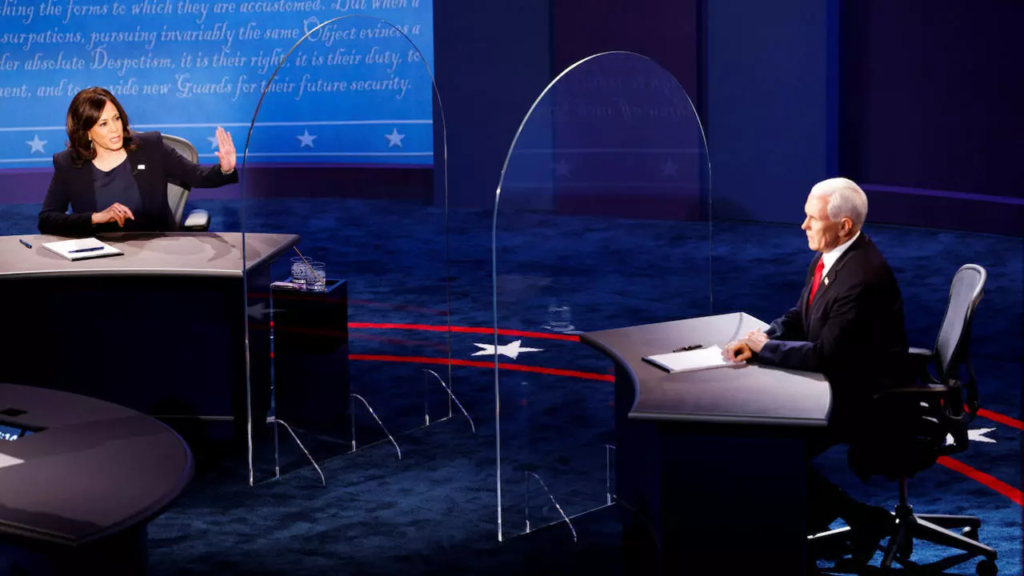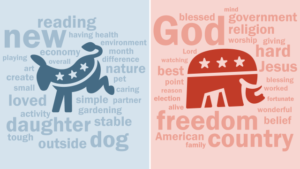The VP Debate: More Important than Ever, but No Impact on November’s Outcome

Image courtesy of Brian Snyder, Reuters
By Shannon Rose Miekka
“Not worth a bucket of warm spit.” That’s how FDR’s number two John Nance Garner described his role as vice president. Almost 90 years later, some Americans still view the VP role as merely symbolic. But 2020 has been a year of firsts, and this VP race matters more than ever. But does it have the power to move voters?
Vice presidential debates historically attract very little viewership, but the debate between Vice President Mike Pence and Democratic challenger Senator Kamala Harris were an exception. Americans have displayed increased levels of engagement and interest in the upcoming election cycle, and more than 60% claimed to be more enthusiastic than usual to vote this November.
There are several reasons to pay closer attention to the two vice presidential candidates this year. Seeing as either victor of the election will become that nation’s oldest president (a title that Trump already carries, having been elected at 70), it is more likely than ever that the vice president could have to assume the presidency before the next election.
Early morning on October 2nd, 2020 came swinging with its first “October surprise”: the White House revealed that President Trump and First Lady Melania Trump tested positive for coronavirus. As of October 11th, Trump’s doctor claims that he is “no longer considered a transmission risk to others” and that his symptoms have improved. His health status has been somewhat unclear, but if President Trump follows CDC guidelines, he will have to quarantine for 10 days after his symptoms first appeared, which only leaves about two weeks before Election Day. Coronavirus is even more dangerous for those in the President’s demographic, and his health status puts Pence’s performance at the vice presidential debate into a new light.
If the President’s COVID diagnosis and the age of both candidates at the top of the ticket aren’t reason enough to tune in, the country is still recovering from arguably the most divisive and incendiary presidential debate in recent history. September 29th’s debate between President Trump and Former Vice President Joe Biden was monumental in its chaos and it left most Americans dissatisfied and upset. George Stephanopolous, who has covered and moderated debates for four decades, called it the worst presidential debate he’d ever seen in his life. He’s not alone; 69% of viewers felt annoyed while watching it, and 77% said that the debate did not make them “proud to be an American.” As a result, it’s likely that more people will tune in to the vice presidential face-off, hoping for a more reasonable, respectful, and informative event.
Clearly the stakes are higher than usual for whomever becomes vice president, but will Wednesday’s debate change how people vote? Probably not. Historically, vice presidential elections have a negligible effect on election outcome. Before and after the eight VP debates between 1976 and 2008, the median change in polling was a meager 1 point. Even if Pence or Harris display a great performance, it is unlikely to affect the race.
In America’s current atmosphere of hyperpartisanship, a Trump voter is unlikely to switch their vote because they think Harris “won” the debate, and a Biden supporter won’t flip because they are impressed by Pence’s debate prowess. Americans do not decide their vote based on the bottom half of the ticket, even if it’s likely for the VP to assume the presidency.
So if the debates have only a negligible effect, can the same be said for the VP pick as a whole? A 2010 study found that the number of conflicted voters— those who prefer the presidential candidate of one party but the vice presidential of the other— has diminished over time. Even still, from 1968 to 2008, a vice presidential candidate had a less than 1% impact on a voter’s decision to cross party lines. This remains true in 2020— 71% of voters said that the selection of Harris as Biden’s running mate will make no difference in how they vote. Even though Harris is the first black woman to be nominated for VP by a major party, the pick had no major effect on Biden’s standing among black voters.
Along with being the first woman of color, Harris is the first Asian American and the first Black American to ever be nominated for vice president on a major party ticket. If Biden and Harris win, the Senator will become the country’s first female vice president and her husband will be the first Jewish and the first male spouse in the White House. According to a Washington Post/ABC News poll conducted in August, 53% of Americans (including 52% of independents) approve of the Harris pick. She holds a higher net positive rating than Biden, Trump, and Pence.
Americans seem to already have their minds (and their votes) made up when comparing Pence and Harris. Even though a majority of Americans believe that both Harris and Pence are qualified to become the president if necessary, Harris beats Pence in this quality by seven points. She also holds the lead on inspiring (+22) and honest and trustworthy (+11). Pence edges out Harris as more experienced (+10), but Harris wins when voters were asked if she “cares about people like you” (+15) and “shares your values” (+13). As of August, 56% of independent voters find Harris more moderate than Pence. As the debate approaches, the Vice President currently has his highest unfavorable rating of his term, with 50% of Americans holding an unfavorable view.
As America nears the end of a bizarre year, the vice presidential debates were worth the watch, even if they have very little effect on the outcome of the election. This match-up very well could be the lineup for the presidential debates of 2024. Pence, who said earlier this year that he couldn’t wait to debate Senator Harris, should not have been underestimated; he was expected to deliver a smooth and modulated debate performance, or “the opposite of [Donald Trump’s performance]” as said by Hillary Clinton’s 2016 campaign chairman John Podesta, and he did just that: 60% of viewers said his performance was “very good” or “somewhat good,” However, he still underperformed compared to his opponent. Senator Harris, whose ticket leads in every national poll, proved herself to be a strong force during the primary debates, which made her more formidable than Pence’s 2016 opponent Tim Kaine. After the debate, Harris’s favorability rating jumped 6 points, whereas Pence finished with his unchanged -14 net favorable rating.
Whether you watched it for a palate cleanser after the presidential debate or to see a showdown between two warm buckets of spit, Americans should pay attention to the VP candidates, because come November, one of them will be only a heartbeat away from the presidency.








